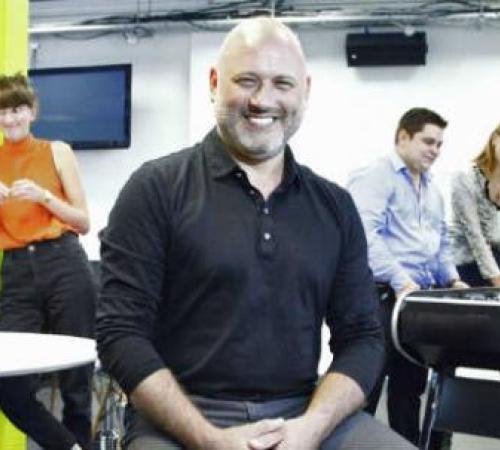
Tech Track 100: How Skyscanner gained its start-up wings

Cast your mind back to the early noughties. Budget airlines were booming and it was the dawn of the age of price comparison sites. People started getting savvy with their travelling and those who once couldn’t afford flights from larger carriers began shopping around for bargain flights. However, this meant undertaking the arduous task of researching all the individual flights yourself.
That’s where Gareth Williams, maths and computing graduate – and coding enthusiast – stepped in. Flanked by two friends, Bonamy Grimes and Barry Smith – soon to become co-founders the three of them set about tackling both a personal and public problem of searching for the best flight deal.
But the origins of Skyscanner weren’t necessarily to revolutionise the industry at first. Instead, they came from a need to solve a very personal problem, according to Gareth: “The idea for Skyscanner arose from frustrations in trying to find cheap flights to visit my brother, who was living in the Alps at the time.”
A quick brainstorming session down the pub with Bonamy and Barry resulted in the first seeds of what would become Skyscanner. “From a simple excel spreadsheet, Skyscanner was born.”
Featuring on The Sunday Times Hiscox Tech Track 100 list (external link) as one of the most successful tech start-ups in the UK, the Skyscanner we know today allows users all over the world to scan millions of flights from different providers and use a wide range of filters to find the right one.
With recommendations from The Independent, The Guardian, Which? Travel and BBC Radio 1, Skyscanner has now become a market leader in independent flight search sites. Not bad for an idea conceived over a few pints.
Now in its eleventh year, Tech Track has ranked Skyscanner number 23 in their league table of successful tech companies, joining the likes of CloudSense, Skimlinks and LMAX Exchange as one of the fastest-growing tech start-ups in the last three years.
“Appearing on Tech Track is very helpful for us – we’ve grown to over 500 employees this year, and continue to hire for both our UK and international offices, so the recognition that comes from Tech Track is helpful in recruiting the best talent out there,” says Gareth.
Now with offices around the world and revenue of £65.8 million in 2013, Skyscanner is valued at $800 million.
Going global from Edinburgh
In Skyscanner’s formative years, the company used word-of-mouth to market the product, which resulted in thousands of users accessing the Skyscanner prototype on a daily basis. Encouraged by this early success, Gareth and his two co-founders quit their day jobs and launched Skyscanner in 2003, setting up their headquarters, somewhat against the grain, in Edinburgh.
With certain cities bursting at the brim with powerhouses of the tech industry and communities of top engineers, designers and investors, the three co-founders’ decision to locate the business in Scotland may have initially seemed counter-intuitive.
“Early on we considered where we should be based as a business and whether we should move to London or Silicon Valley. We were, to a large extent, bucking the trend by setting up a technology business ten years ago but Edinburgh now has a very vibrant tech start-up community and it’s a great place to have our headquarters. It’s a very supportive environment too, so we feel lucky to be here.
“The more start-ups that establish in one place can really help to motivate each other and build confidence among other entrepreneurs.”
Skyscanner’s Scottish base has the advantages of being located near Edinburgh University and their world-class informatics computer science department, as well as a number of Scotland’s excellent universities, which, as he points out – “provides a rich source of skilled people for a company like ours.”
Sticking with his instincts to set up in a start-up community, benefitted Gareth in other ways too. While the landscape of the tech industry seems to be dominated by big corporations, there’s a mode of thought that maintaining entrepreneurial qualities can actually stimulate growth and innovation.
“We certainly do our best to keep the start-up mentality,” says Gareth. “Maintaining the culture we have isn’t easy, but we do a good job of it – things like seat swapping every six months or so allow an engineer to sit near a marketer, and they both understand the roles of each other more than before.
“I once said you can’t have a corporate mind-set if you want to innovate, and I still stand by that – we really value entrepreneurial qualities such as getting stuck into solving hard problems, not being put off by obvious hurdles, and looking for different ways to get something done. As a company we’re very flat in our structure and we place a lot of trust in employees, regardless of their area of work or level.”
Speed is of the essence
Having a programmer on the founding team was an essential element to the development of Skyscanner. While the three co-founders were working around ideas for the flight comparison site, they were struck with the issue of making the site run fast enough to make it worthwhile.
Forty-five seconds may seem an eternity to return results today but at the time this was the speed of one of Skyscanner’s market-leading competitors, so the co-founders decided to store flight prices in a ‘price cache’, allowing customers to search their database for flights, rather than trawling third party sites.
“A lot of start-ups try to outsource the coding, which can work, but that seems odd to me. It’s like trying to set up a fashion shop if you’re not interested in fashion. Anyone wanting to create a tech start-up should try to have that expertise in-house.”
This was certainly important for Gareth, whose site now sees 30 million people using it each month to book their airline tickets. This doesn’t include the Skyscanner app, which has been downloaded more than 35million times.
Quick wins and enjoying small successes
While staying faithful to his start-up roots, Gareth has come a long way since he first met his co-founders. Although he’s transitioned from working as an IT contractor – or ‘programmer for hire’ as he calls it – to CEO of a market-leading flight search site, he maintains life isn’t so different.
“It’s changed less than you might imagine. I’m still driven by the same goals, frustrated by similar problems, and live a largely similar life. However, I do spend much more time speaking to people than sitting in front of a screen these days.”
While Gareth’s attitude to life remains more or less unchanged by the transition, he alludes in many interviews to a principle he wished he’d followed during his time building the business.
“I’d enjoy the journey more, as I’m a firm believer in that the actual point at which you become successful is elusive and therefore you need to enjoy the small successes along the way. That’s probably the biggest lesson.”
Despite his humble approach to success, he offers a few final words of wisdom to budding entrepreneurs in the field.
“In general, keep true to your instincts. I’m a fan of Derek Siver’s thinking – ideas are worthless unless executed.”
Read more about The Sunday Times Hiscox Tech Track 100 here.
Disclaimer:
At Hiscox, we want to help your small business thrive. Our blog has many articles you may find relevant and useful as your business grows. But these articles aren’t professional advice. So, to find out more on a subject we cover here, please seek professional assistance.




